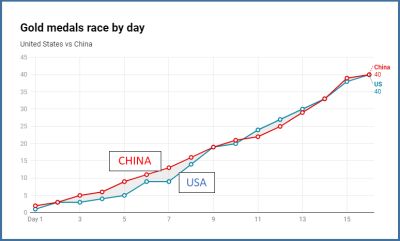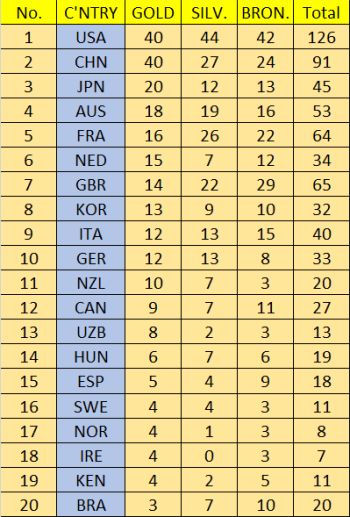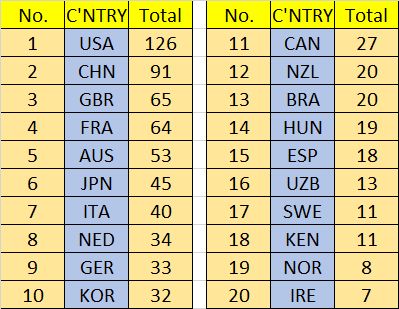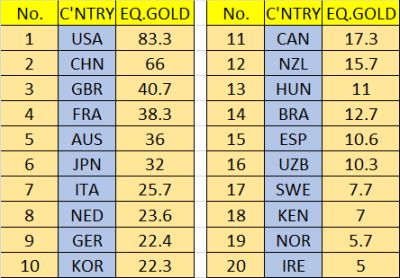Jan 07, 2026
Jan 07, 2026
In the recently concluded Olympic Games in Paris, there was a neck-to-neck race between the United States of America and the People’s Republic of China for the top position in the Medals Table. The race went down to the wire. The last gold medal event of the Games was the women’s basketball final match between the USA and the host nation France. At the start of the match, China had 40 gold medals and the USA had 39. The USA just managed to defeat France by a narrow margin and caught up with China in the gold medal tally. The close race is depicted in the graph below. The X-axis is for the day number (1 to 16) and the Y-axis is for the number of gold medals won by China and the USA.

The USA moved to the top of the Table on account of the higher number of total medals secured.

Table 1. Order on “gold” basis
The above Table lists the top twenty countries. The ordering is the basis of the number of gold medals as per the convention followed. No weightage is given to the number of silver and bronze medals secured by the countries. If the USA had lost the basketball final match it would have occupied the second position although its total medal count was much more than that of China. We may recall that India secured one silver and five bronze medals and was ranked 71st. Pakistan, on the other hand, secured only one gold medal and occupied the 62nd position. An alternative would be to order the countries according to the total number of medals secured.

Table 2. Order on “Total” basis
The above Table lists the top 20 gold-medal countries in the order of decreasing number of total number of medals. There are changes in the rankings but for the top two countries. Brazil, for example, has jumped from the 20th position to the 13th. It should also be noted that if we consider the complete list, a few countries may drop out of the above Table.
A drawback in this ranking system, however, is that we are giving equal weightage to all three categories of medals.
An obvious third alternative would be to arrive at a “weighted” total. We can also call this an “equivalent gold” basis. I have arrived at weights of 1.00, 0.67, and 0.33 for gold, silver, and bronze respectively before computing the total. These numbers are arbitrary but sound reasonable. The implications are that three bronze medals are equivalent to one gold medal and three silver medals are equivalent to two gold medals. Further, one silver and one bronze together will be equal to one gold.

Table 3. Equivalent gold basis
The Table above lists the countries in decreasing order of the “equivalent gold” medals. The ordering can be observed to be different from the other two tables.
If we apply this criterion, India will gain tremendously in ranking. With one silver and three bronze, India will have an Equivalent Gold score of 2.3. Its ranking will be higher than those of countries with just two gold medals. In the Paris Olympics, Indonesia and Algeria are tied at the 39th place. Each of them has two golds and one bronze. Thus their equivalent gold score is 2.3, the same as that of India. Thus, with this criterion, India can move up by about 30 places.
Pakistan has an equivalent gold score of 1.0 and is occupying the 62nd position. In the 72nd position is Moldova with one silver and three bronze medals and an equivalent gold score of 1.67. Kosava is in the 73rd position with one silver and one bronze medal and thus an equivalent gold score of 1.0. Pakistan will thus be in the 73rd position with the suggested criterion.
SUMMARY AND RECOMMENDATION
The current method of ranking countries in the Olympic games is unfair. This fact is underscored by two glaring comparisons. The first is between the USA and China. We have seen that the USA would have been ranked second had they lost to France in the women’s basketball final. The second comparison is between India and Pakistan. Pakistan won a single medal. India displayed better all-round capability by securing six medals covering four different disciplines.
The main recommendation to the Olympic Committee is to review the prevalent method and adopt the suggested approach of calculating weighted total or equivalent gold.

|
Interesting suggestion! |